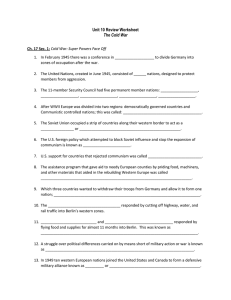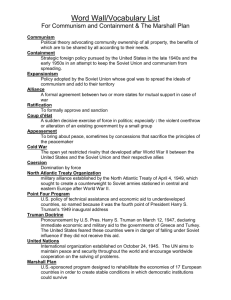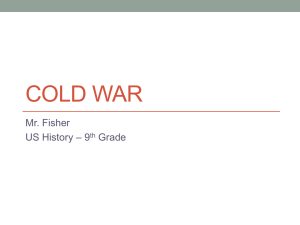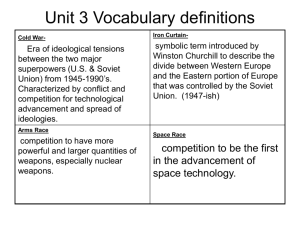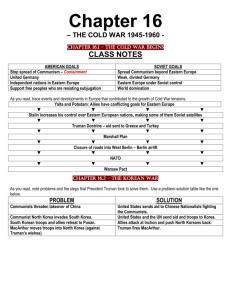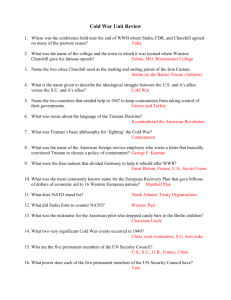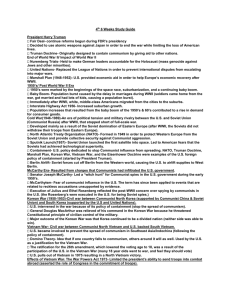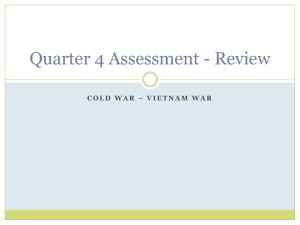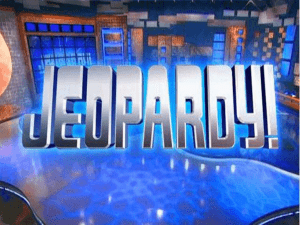Unit 9: Cold War Unit Test - adstokes
advertisement
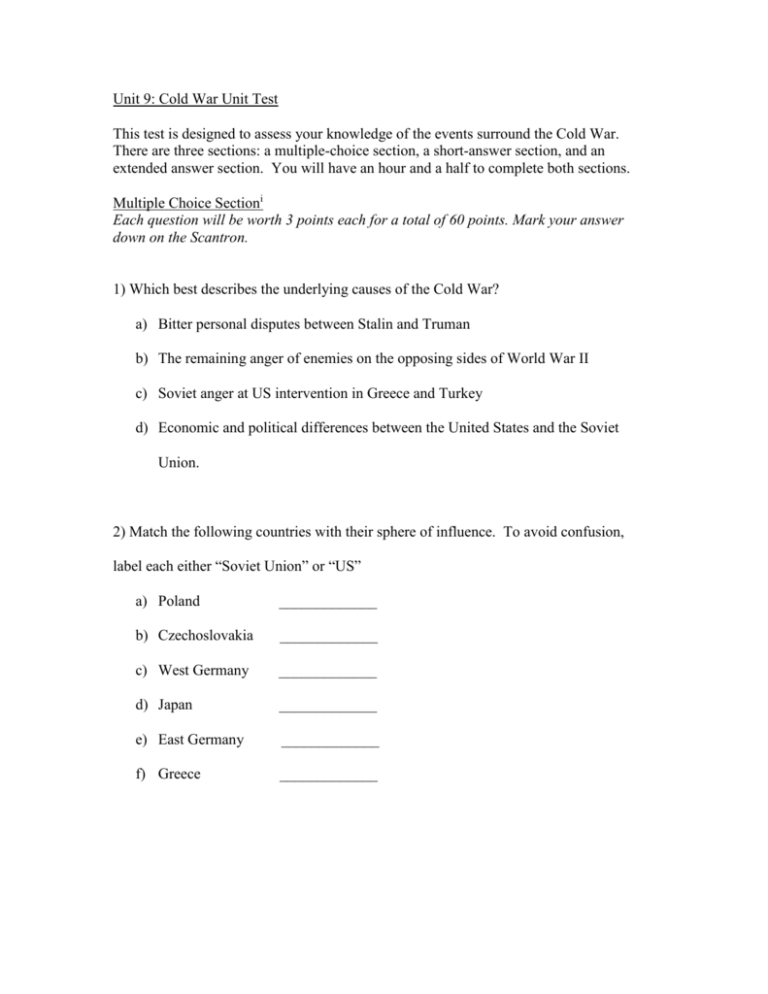
Unit 9: Cold War Unit Test This test is designed to assess your knowledge of the events surround the Cold War. There are three sections: a multiple-choice section, a short-answer section, and an extended answer section. You will have an hour and a half to complete both sections. Multiple Choice Sectioni Each question will be worth 3 points each for a total of 60 points. Mark your answer down on the Scantron. 1) Which best describes the underlying causes of the Cold War? a) Bitter personal disputes between Stalin and Truman b) The remaining anger of enemies on the opposing sides of World War II c) Soviet anger at US intervention in Greece and Turkey d) Economic and political differences between the United States and the Soviet Union. 2) Match the following countries with their sphere of influence. To avoid confusion, label each either “Soviet Union” or “US” a) Poland _____________ b) Czechoslovakia _____________ c) West Germany _____________ d) Japan _____________ e) East Germany _____________ f) Greece _____________ 3) The Truman Doctrine is an example of which United States strategy? a) Containment b) Détente c) Soft power d) Force projection 4) What did the Marshall Plan do? a) Divided Germany into East Germany and West Germany b) Provided aid to the people of Europe c) Described a policy of “containment” of communism d) Declared war on the Soviet Union 5) Which of the following is NOT an example of containment? a) United States military aid to the right-wing government of Greece during the Greek Civil War b) United States defense of South Korea during the Korean War c) CIA assassinations of communist leaders in Latin America d) Western countries joining the North Atlantic Treaty Organization (NATO) to ensure mutual defense. 6) What generalization about the Korea War is supported by information on the maps? a) b) c) d) The war began when South Korea attacked North Korea General MacArthur launched an invasion of China early in the war Neither side experienced a major military victory in the war At the end of the war, Korea remained a divided country 7) Which of the following presidents would have been least likely to agree with the Truman Doctrine? a) George Washington b) Franklin Roosevelt c) Theodore Roosevelt d) Woodrow Wilson 8) Which of the following words best describes the build up of US troops in Vietnam? a) b) c) d) popular gradual sudden successful 9) During the Cold War, American troops were stationed in all but which of these countries? a) b) c) d) Turkey Grenada Cambodia US troops were stationed in all of the above countries 10) In response to the formation of NATO, the Soviet Union a) b) c) d) Left the United Nations Ended the Berlin Airlit Created the Warsaw Pact Joined the Marshall Plan 11) Mutually-Assured Destruction (MAD) is most closely related to which of the following US strategies? a) b) c) d) Containment Massive retaliation Détente Isolationism 12) What was the long-term effect of the Marshall Plan? a) b) c) d) it undermined the popularity of the Soviet Union It fostered resentment among the people of West Berlin It made the European economy worse It kept Germany from rebuilding an army 13) Which of the following was not a factor leading to the United States involvement in Vietnam? a) French unwillingness to place more troops in Indochina b) The Gulf of Tonkin incident c) Corruption by South Vietnamese leaders d) Desire of the US to contain the spread of communism 14) The United States’ experience during the Vietnam War supports the idea that the outcome of a war a) b) c) d) is determined mainly by technological superiority is dependent on having the greater number of troops is assured to countries dedicated to democratic ideals can be strongly affected by public opinion 15) Following the United States’ military withdrawal from Vietnam in 1973, Vietnam a) b) c) d) became a democratic nation remained divided between North and South adopted a communist form of government was quickly taken over by China 16) The growth of McCarthyism in the early 1950s was based on a) b) c) d) a public fear concerning the spread of communism in the United States outrage over government corruption dissatisfaction over the results of World War II hardline military officers who supported attacking the Soviet Union 17) Which of the following is not an outcome of the Cuban Missile Crisis a) The United States removed their nuclear missiles from Turkey b) The United States and Soviet Union established a hotline to improve communication c) The United States regained Cuba into their sphere of influence d) John Kennedy became more popular among the American people 18) The image above shows which consequences of the Cold War? a) b) c) d) The space race led to a high emphasis on math and science in US public schools Students were drilled on how to respond to a nuclear attack Increased funding for public education Stricter discipline in schools to protect against communist influence 19) The Berlin Airlift can best be described as an example of which US policy? a) b) c) d) Brinksmanship Détente Containment Marshall Plan 20) The creation of the United Nations Security Council addressed which major flaw of the League of Nations? a) b) c) d) Lack of United States membership Eliminating the presence of an overly-powerful international police force The inability for the international community to use force The inability to raise funds for international operations Short Answer Section Respond to each of the following four questions in three to five sentences. Write your response on the lined paper on the back of the test. Be sure to number each response. Each question will be worth 6 points. 21) How were troops greeted when they returned home from Vietnam? Is this similar or different to the treatment veterans received after other armed conflicts? 22) In your own words, describe Mikhail Gorbachev’s policies of perestroika and glasnost. 23) How was the Soviet involvement in Afghanistan similar to the American involvement in Vietnam? 24) Why was the United Nations more effective than the League of Nations? Essay Section (16 points) In five paragraphs, answer the following prompt. Be sure to include at least three pieces of evidence to support your response. Prompt: Who is more responsible for the end of the Cold War: Mikhail Gorbachev or Ronald Reagan? i Questions 1, 6, 10, 15, and 18 were taken from the Woodside High School social studies departmental exam
